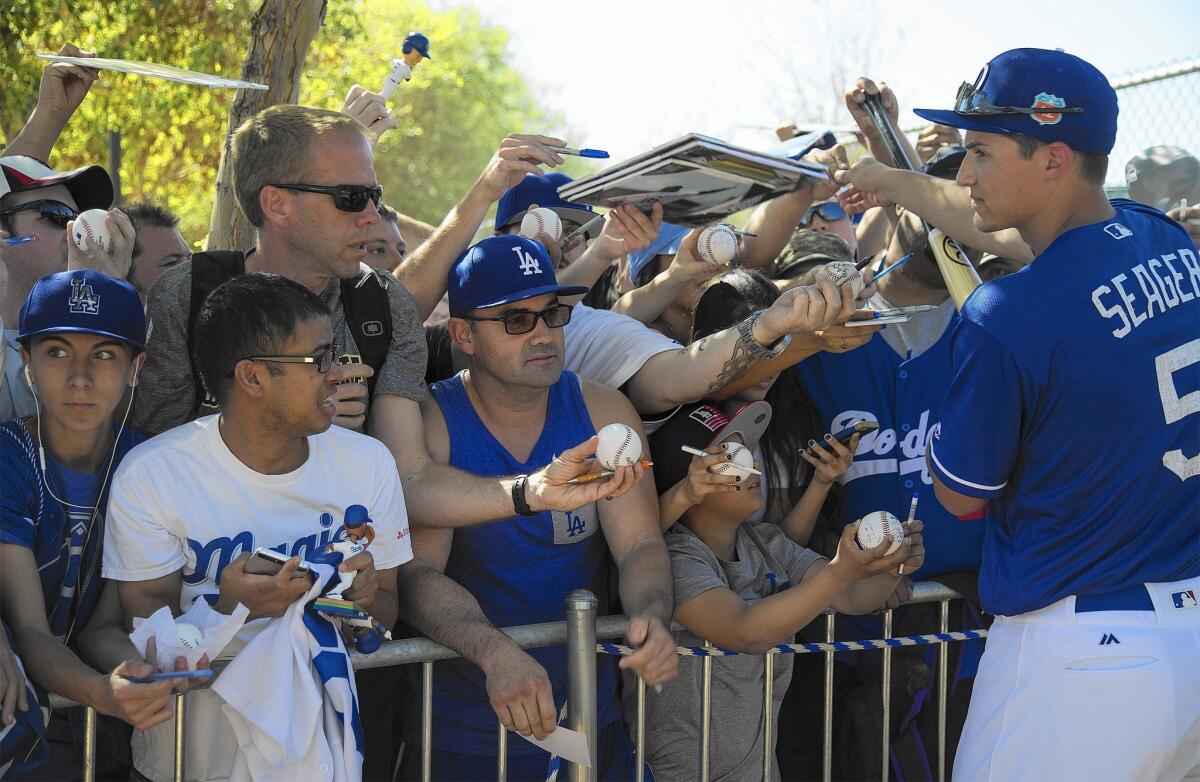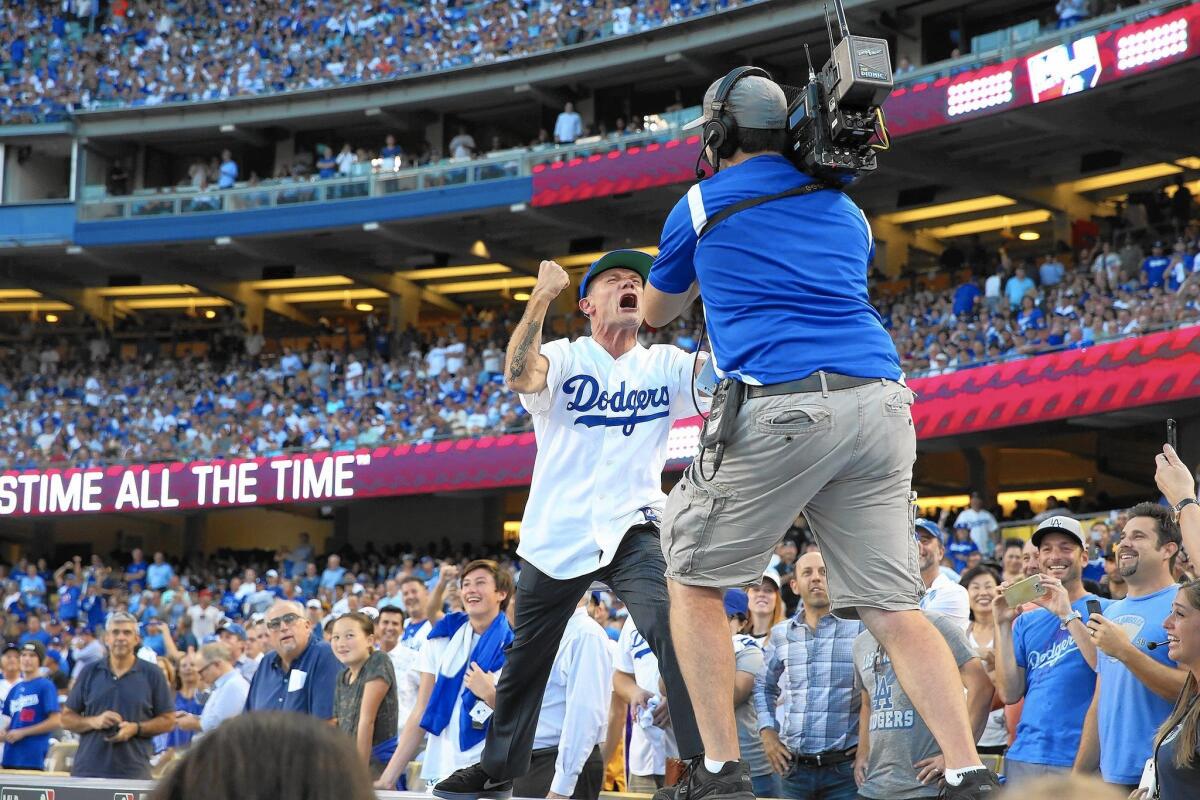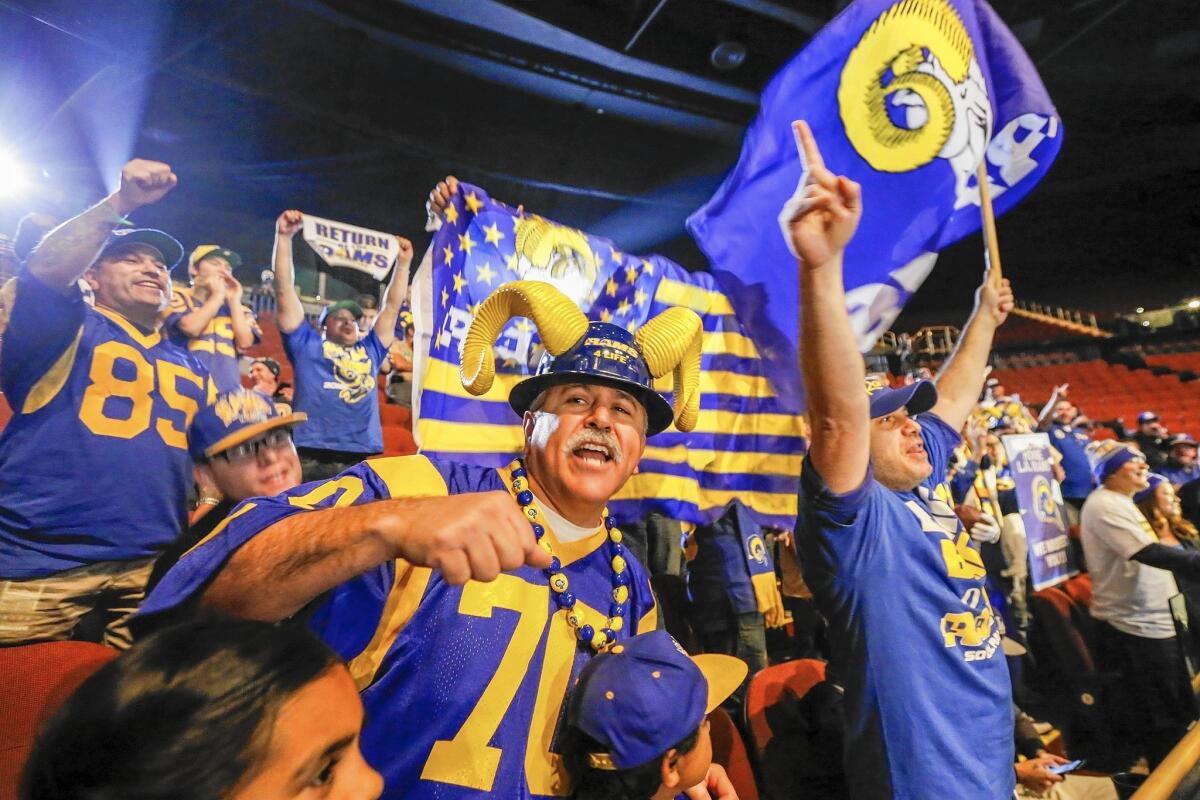With high ticket prices and TV blackouts, Big Sports lose their appeal

Fans crowd a barricade to get autographs from Dodger shortstop Corey Seager on Feb. 27. Local fans are in Year 3 of a TV blackout for the team, which signed an $8-billion rights deal with Time Warner Cable.
- Share via
I once took my sons to a pro football game.
This made a lasting impression.
Before the kickoff, we saw so many fans urinating in the parking lot, they could have put out a bonfire.
During the game, we were surrounded by teetering, F-bombing drunks.
This was in Philadelphia, where you could get a concussion just watching the game. There were so many arrests in the stands that the stadium had its own courtroom.
Join the conversation on Facebook >>
And those were the good old days of the National Football League, when ordinary people could afford tickets.
All of which is my way of saying that regarding the long-awaited return of the NFL to Los Angeles, I’m tempering my enthusiasm.
Don’t worry about me, though. Go ahead and celebrate. I’m just going through another phase of my love-hate relationship with Big Sports.
You pick a sport, I’ve got issues.
Let’s take baseball.

Flea pleads with Dodger fans during Game 5 of the 2015 National League Division Series at Dodger Stadium.
The Dodgers have reported to spring training, which means that hope springs eternal, unless your hope is that you’ll be able to watch games on television this year.
We are entering Year Three of a blackout for two-thirds of local residents, thanks to an $8-billion TV rights deal the Dodgers cut with Time Warner Cable, and the refusal of carriers to pay the cable giant’s ransom.
Here’s the box score on that:
The Dodgers got rich, the team is so-so, you’ll probably miss broadcast legend Vin Scully’s last season, and the price of tickets has gone up, booting ever more families out of the stadium.
“I think it’s disgusting,” said Dodger die-hard Terry Kinigstein, a retired lawyer in Calabasas. “It’s just insane.”
I check in with Kinigstein each year just so I know I’m not the only cranky old guy whose jaw still drops at the level of greed in play here.
When it comes to Dodger broadcasts, I understand there’s a way to beat the system by masking your location in a blackout zone and streaming the games.
I’m not sure if it’s legal, but I guarantee you that a jury of your peers will let you off when you tell them the Dodgers and their greedy $8-billion deal made you do it.
I happen to be a Time Warner Cable subscriber, so I can tune in if I choose. But I won’t feel good about myself if I do.
It’s hard for me to separate the escapist thrill of watching a ballgame from the unrelenting reminder that sports fans are willing dupes in a get-rich scheme.
In the case of the NFL, there’s the added baggage of too many stories about gunplay and domestic violence among players, not to mention a scandal as unforgivable as baseball’s years-long, profit-protecting coverup of steroid abuse.
One of the hazards of football is permanent brain disease.

Rams fans attend a news conference in Inglewood with the city’s mayor, James Butts Jr., and team owner Stan Kroenke on Jan. 15 to welcome the team back.
The ram is the perfect mascot, when you think about it.
NFL executives and owners have been compared to tobacco industry tycoons who denied a connection between smoking and cancer. At one point, the NFL even disputed a study — a study it funded — that concluded that retired players were 19 times more likely to develop dementia, Alzheimer’s and other memory-impairment diseases.
Thousands of former players have sued the league, others have ended their torment by committing suicide. And yet with all the pressure to change the rules and protect players, concussions were up 32% in the NFL last year.
So what did NFL Commissioner Roger Goodell have to say before this year’s Super Bowl, in which two more players suffered concussions?
“There’s risk in life. There’s risk sitting on the couch.”
Yes, there is. You might hear something that stupid, fall off that couch and crush your cat.
Speaking of this year’s Super Bowl, it was a big deal for L.A. Philharmonic music director Gustavo Dudamel’s Youth Orchestra Los Angeles, which was invited to perform at halftime.
I thought it would be nice to run a column about the young musicians on the day of the Super Bowl, but that wasn’t possible.
Why not?
As explained by the L.A. Phil, the NFL controls such matters and decreed there would be no interviews until after the show.
Thanks, guys.
Nice game, by the way. The commissioner was right.
It was such a dud, I dozed and fell off my couch.
So pardon me for not getting in line to purchase tickets for the Rams’ return to the Coliseum and later to a $2-billion stadium in Inglewood, with average NFL ticket prices currently between $125 and $400 each.
And now there’s a trend to require the purchase of seat licenses as well, with price tags in the thousands of dollars.
This will leave most fans watching on television, same as ever, while the high rollers pay more for a seat license than we spend on students per year in Inglewood’s cash-strapped schools.
I’d like to believe the hype about the new stadium and adjacent commercial development creating thousands of jobs and revitalizing the local economy.
Except that short-term construction gigs and a bunch of part-time minimum wage jobs aren’t what the area needs.
The stadium will consume vast spaces but rarely be occupied, with just 10 home games and other events only occasionally.
Not many long-term, living-wage jobs in that.
My wild guess is that the biggest winners will be the NFL and the billionaire owner of the Rams, with the help of the tax breaks built into the deal.
I hope I’m wrong.
And I hope you can see the Dodgers on television this year.
It’s spring, and against all odds, you gotta believe.
Twitter: @LATstevelopez
MORE FROM STEVE LOPEZ
The presidential race is so awful you can’t look away
The pristine beauty of California’s coast shouldn’t be for the few
If East L.A.’s Latinos speak for the nation’s, a wall could come tumbling down on Trump
More to Read
Sign up for Essential California
The most important California stories and recommendations in your inbox every morning.
You may occasionally receive promotional content from the Los Angeles Times.














